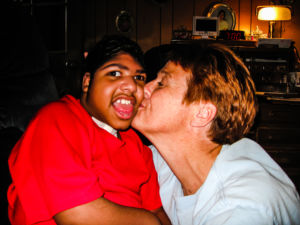A family home where a child is a loved member and supports are in place to meet the child’s and family’s needs is important to a child’s well-being. For most children, a family home is with the child’s parents. But it can also be with another family.
Some parents are unable to care for their children at home or to bring them home from a facility where they’ve been placed. Even with services, supports and funding, parents may not feel they can overcome other things within the family or home. Sometimes they can’t change circumstances. Sometimes they can’t move past difficult or painful experiences and memories.
If parents are not able to care for their children at home, EveryChild begins a delicate conversation about the possibility of another family caring for their child. For some parents, keeping the child’s care within the extended family may be a feasible alternative. Sometimes extended family—grandparents, aunts, uncles, cousins—can be a consideration. With access to funding, services, and supports they may be able to open their home to a child who can’t live with his or her parents.
Support Families
If living at home or with extended family is not a possibility, there is another option—a Support Family. A Support Family is a family who is recruited, vetted, and prepared to care for child with disabilities in their home.
Support Families provide:
- Safety, security, and stability in a family home.
- A committed, nurturing, and enduring parental relationship with the child that supplements their relationship with their parents.
- A cooperative and collaborative relationship with a child’s parents.
Two loving families
Parents can deeply love their children. But love can’t always overcome the very real circumstances that prevent some parents from raising a child with a disability. If parents find they can’t care for their children at home, considering a Support Family can be a promising alternative to placement in a facility.
When initially presented with the idea, many parents feel uncomfortable or skeptical at the thought of another family caring for their child. Over time, with thoughtful and respectful engagement in learning about and meeting Support Families, parents can come to understand how a Support Family can be helpful to them and their child.
A key to a Support Family arrangement is enabling parents to remain involved in their child’s life and maintain their parental decision-making authority. Parents choose which Support Family cares for their child. In some arrangements, both families share care with the child moving between the two households (similar to situations involving divorce). Other times, parents rely on the Support Family to provide most of the care while they are able to visit. Support Family arrangements can grow to feel like extended family relationships.
The goal is for the two families to arrive at an arrangement of mutual trust and comfort.
Agreeing for a child to move to a Support Family is a loving parental decision. EveryChild can help families find a Support Family.
EveryChild can help find Support Families
A Support Family may be found through a relationship with someone parents already know—someone who has a special relationship with the child. Examples include a school teacher or aide, a respite caregiver, or a caregiver from a facility where a child has lived.
But sometimes successful Support Family arrangements arise from families who are introduced to each other. A great deal of EveryChild’s work centers on recruiting Support Families and linking them to parents who are unable to care for their children at home. EveryChild has helped hundreds of children with disabilities be able to leave institutions to live with Support Families chosen by their parents.
The key is finding the right Support Family. EveryChild can help.
